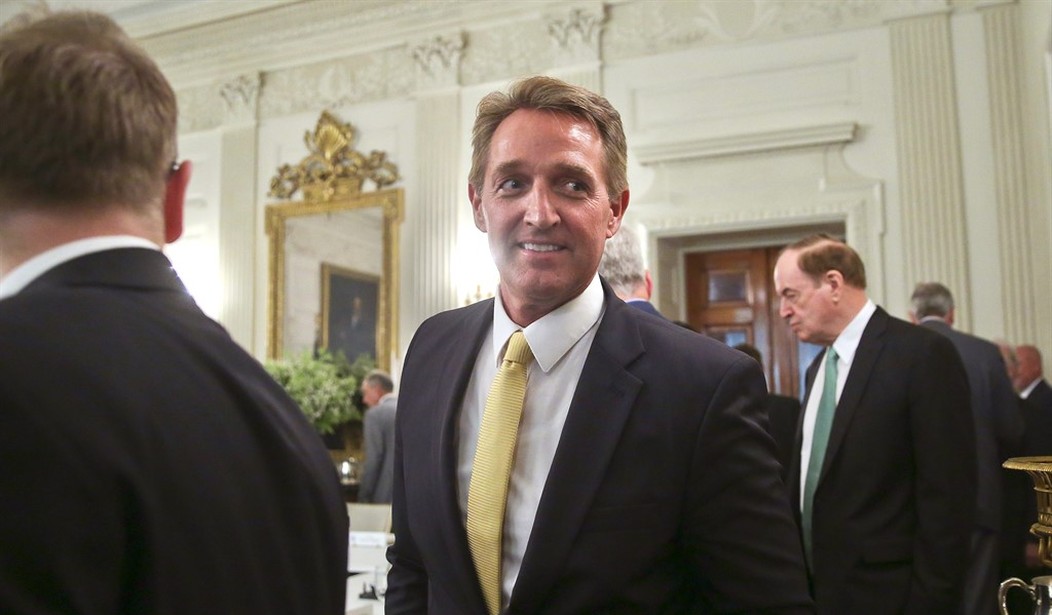C’mon. I can believe his job approval in a red state is now garbage after he roundhoused Trump on TV and in print day after day this past week.
But flaming garbage?
The guy didn’t even vote against “skinny repeal” of ObamaCare. He was with the White House on the biggest gut-check of Trump’s presidency to date. And yet, new numbers out of Arizona from PPP:


In a hypothetical race with a generic Democrat, a Republican incumbent in a red state is below 50 percent within his own party? No way. And that 18 percent overall job approval — nuh uh. Nothing in America polls at 18 percent except cancer, tax hikes, and Republican health-care bills.
Morning Consult polled Arizona from early April to mid-June and found Flake at 36/42 approval overall and 51/35 among Republicans. That seems more plausible. The guy’s clearly in trouble, ripe for either a primary challenge from the populist right or a tough midterm general election from a centrist Democrat in a purple state, but an incumbent’s not going to pull 22 percent job approval within his own party (as PPP has it) unless he’s voted to legalize heroin or something. But then, the Morning Consult numbers were gathered before Flake published his new anti-Trump book and began criticizing the president consistently and aggressively over the past 10 days or so. Trump was at 65 percent approval among Arizona Republicans in the PPP poll. Is it possible that Flake warring with the leader of the GOP has tanked his support?
It could also be that Flake’s libertarian brand of conservatism is increasingly a relic within the party, leaving even some Republican voters walking away from him. Reihan Salam calls Flake a Reaganite in a post-Reagan country:
To Flake, the only way forward for the GOP is to embrace the small-government philosophy he attributes to Goldwater and Ronald Reagan and to place the pursuit of more open trade and immigration policies at the heart of the party’s policy agenda. This is despite the fact that when Reagan championed higher immigration levels, the labor market position of less-skilled workers was just beginning its long, downward slide, a decline that has been hard on working-class natives and immigrants alike. In the Reagan era, we also didn’t already have a large population of immigrants and children of immigrants living in or near poverty, millions of whom depend on programs like Medicaid that Flake is so eager to slash.
As for trade policy, I have no quarrel with the idea that tariffs are bad. What is also true, however, is that the offshoring of high-tech profits to Ireland and other tax havens is at least as big a deal as the offshoring of low-wage jobs to China. Global imbalances also helped create the conditions for the last financial crisis and pose an ongoing threat to global prosperity. If we want to preserve the benefits of globalization, we should probably rewrite the tax code in ways that will displease multinationals, and we should also probably nudge surplus countries such as China and Germany into being more constructive economic partners.
Flake’s response to the changing economy and resulting changes in the party’s ideological lean is to say, “Given the alternatives, I’ll take the globalist moniker, thank you.” Good for him. The man has the courage of his convictions. What he may not have much longer is a job.
One more result from the PPP poll. Which doesn’t belong and why?

Democrats are far less likely to vote for Flake after he cast his vote for “skinny repeal,” which makes perfect sense. So are independents, which stands to reason — the GOP’s health-care efforts have been broadly unpopular and Flake was all aboard. Then you move to the Republican column and … w-w-w-what? Flake voted with Trump to repeal ObamaCare and a plurality of GOPers now say they’re less likely to vote for him? I assume that’s a combination of the bill being somewhat unpopular even on the right and simple ignorance of how Flake actually voted. When asked if they approve of McCain’s vote on skinny repeal, which of course was “no,” sinking the bill, Arizona Republicans split 35/60. Flake voted yes, meanwhile, yet Republicans are less likely to vote for him now than before. Presumably a bunch of GOPers in the state are under the mistaken impression that Flake also voted no, possibly because he usually votes with McCain and possibly because their general disdain for him as a “RINO” is coloring their guess at how he voted. Whatever the truth, he’s caught in a bind now. If he advertises his yes vote to win back Republicans, he alienates independents. If he downplays it, R’s may continue to mistakenly believe he helped sink repeal.
Oh, and just to add to the weirdness: When you ask Trump voters (as opposed to Republicans generally) whether Flake’s health-care vote makes them more or less likely to support him, they answer rationally. A plurality of 43 percent say “more likely” versus 27 percent who say “less likely.” How is it that Trump voters seem to know how Flake voted but Republicans don’t? Or is it that both groups know how he voted and even Republicans ended up hating “skinny repeal”?








Join the conversation as a VIP Member